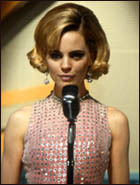| |
 |
|
|
Lynch’s women ultimately signify a marvellous
beauty while they are also branded by the blue-black corruption
which festers behind charming and conventional (contemporary
and post-war) America. Of course, this is not a new theme
in Lynch’s work. Such perceptions are richly painted in Blue
Velvet. Yet in Mulholland Drive, Lynch not only
sustains but deepens his dualistic poetic vision in his portrait
of Hollywood. Lynch’s Hollywood women are profoundly ambivalently
portrayed.
Lynch’s Mulholland Drive is an ambiguous and often
amusing satire of the lies and pretensions of Hollywood. Simultaneously,
it is a prose poem in love with Hollywood’s mastery of illusion
as it is fascinated by its repellent underbelly and monstrous
capacity to engender myths. Before they journey to the apartment
of Diane Selwyn, Betty has her promising Hollywood audition
playing a young, under-aged girl involved with a friend of
her father. It is one of Mulholland Drive’s finest
scenes. The audition reveals Betty as a gifted actress capable
of inhabiting the transformation of an exploited innocent
into a powerful, sensual seductress and represents the peak
of Naomi Watts’s extraordinarily altering, multi-layered performance.
Betty naturally loves being someone else. Intertextually,
the stunning audition prefigures her own curve from light
to darkness, namely her transformation from a positive, loving
actress into a self-hating, homicidal failure. The audition
scene also amusing critiques the absurd pretensions of Hollywood
and the eternal objectification of younger women by older
men within both the system and storylines. The older actor
who plays Betty’s character’s lover is a aged, sun-burnt Lothario
played by Chad Everett. Entrapping Betty in his arms, he urges
her : “We’ll play this nice and close... Just like
in the movies”. The acting coach evaluates the actors’
performances with the divertingly ponderous and phony :
“It was forced, maybe, but still... humanistic”. Additionally,
Lynch pointedly mythifies and satirises Hollywood in anachronistically
depicting a film industry in thrall to the studio system.
 |
|
|
|
Leaving the audition, Betty’s excited,
radiant blue eyes meet the intent gaze of the young director
Adam who is lip servicing an audition for a young blonde actress
called Camilla Rhodes chosen against his will by the Mafia.
Significantly, they are auditioning for a fifties doowop musical
picture. We also see Adam auditioning a famous actress for
a musical scene where she mimes Connie Stevens’s hit Sixteen
Reasons. The studio actress, Camilla Rhodes, in blonde
bob and pink lipstick, then lip-synch’s Linda Scott’s Every
Little Star. Lynch seems to adore the girlie bubble gum
music of the post-war years. As in Blue Velvet, early
pop music is given a subversive coating. Expressing Lynch’s
dualistic poetic vision, they provide the soundtrack to corruption.
Initially incongruous, the sounds of innocence are yet they
are surreally bound to the terrible and perverse. Lynch’s
nostalgia is always sweet and sinister. Moreover, in Mulholland
Drive, bright and swooning girlie songs are made sexually
subversive. Their lyrics which express a teenage girl’s chaste
love for a boy are coloured and wryly transformed by Mulholland’s
sapphic romance, eroticism and violence.
Adam is distracted by Betty’s gaze. It is a look of yearning
and promise, expressing both sexual and professional interest
but Betty, we will see, will never work for the director.
In previous sequences within the dream narrative of Diane,
we follow the events which lead to Adam’s disempowerment as
his creative control is usurped by the Mafia and his dignity
robbed by his adulterous wife. His movie is pulled and he
is bizarrely made bankrupt. At the studio meeting watched
by the dwarf mogul in a mausoleum room, Adam is not only relegated
by the criminal fraternity but forced to endure their sinister
pushiness and their absurd vagaries. The demands of the bizarre
Hollywood elite apparently extend to an absolutely anal search
for the right kind of espresso. The bizarre meeting is held
up for a testing of the coffee which turns out to be wholly
inadequate. Adam ultimately watches in amazement as a Mafioso
executive spurts the offending cup of coffee. Lynch’s satire
of Hollywood power is markedly absurdist. The faking, fawning
and flaying are wonderfully exhibited.
|